Intro
Reduce cholesterol with Rosuvastatin, a statin medication that lowers LDL and triglycerides, while increasing HDL levels, effectively managing hyperlipidemia and cardiovascular risk.
The importance of maintaining healthy cholesterol levels cannot be overstated. High cholesterol is a significant risk factor for cardiovascular disease, which is one of the leading causes of death worldwide. Managing cholesterol levels through a combination of lifestyle changes and medication can significantly reduce this risk. One of the most commonly prescribed medications for cholesterol reduction is rosuvastatin, a statin that has been proven to be highly effective in lowering cholesterol levels. Understanding how rosuvastatin works, its benefits, and potential side effects is crucial for individuals looking to manage their cholesterol levels.
Cholesterol is a fatty substance that is essential for various bodily functions, including the production of cell membranes, hormones, and vitamin D. However, when cholesterol levels become too high, it can lead to the buildup of plaque in the arteries, known as atherosclerosis, which can increase the risk of heart attacks, strokes, and other cardiovascular diseases. Rosuvastatin is used to reduce the levels of "bad" low-density lipoprotein (LDL) cholesterol and increase the levels of "good" high-density lipoprotein (HDL) cholesterol in the blood. By doing so, it helps to prevent the progression of atherosclerosis and reduce the risk of cardiovascular events.
The mechanism of action of rosuvastatin involves the inhibition of an enzyme called HMG-CoA reductase, which plays a key role in the production of cholesterol in the liver. By blocking this enzyme, rosuvastatin reduces the amount of cholesterol produced by the liver, which in turn lowers the levels of LDL cholesterol in the blood. This reduction in LDL cholesterol levels can help to slow down the progression of atherosclerosis and reduce the risk of cardiovascular disease. Rosuvastatin is also known to have anti-inflammatory properties, which can help to reduce inflammation in the blood vessels and further reduce the risk of cardiovascular events.
Rosuvastatin Benefits
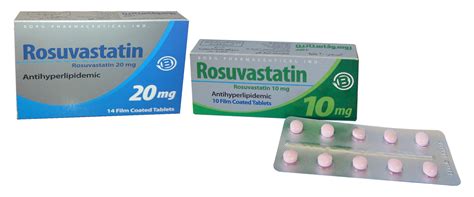
In addition to its cholesterol-lowering effects, rosuvastatin has also been shown to have anti-inflammatory properties, which can help to reduce inflammation in the blood vessels and further reduce the risk of cardiovascular events. This can be particularly beneficial for individuals who have already experienced a cardiovascular event, as it can help to prevent further events from occurring. Overall, the benefits of rosuvastatin make it a highly effective medication for reducing cholesterol levels and preventing cardiovascular disease.
How Rosuvastatin Works

The mechanism of action of rosuvastatin involves several key steps. First, the medication is absorbed into the bloodstream, where it is then transported to the liver. In the liver, rosuvastatin inhibits the HMG-CoA reductase enzyme, which reduces the production of cholesterol. The reduction in cholesterol production leads to a decrease in the levels of LDL cholesterol in the blood, which can help to reduce the risk of cardiovascular disease.
Rosuvastatin Dosage
The dosage of rosuvastatin can vary depending on the individual's cholesterol levels and medical history. The typical starting dose of rosuvastatin is 10-20 mg per day, which can be adjusted based on the individual's response to the medication. It is essential to follow the prescribed dosage and not to exceed the recommended dose, as this can increase the risk of side effects.Rosuvastatin Side Effects
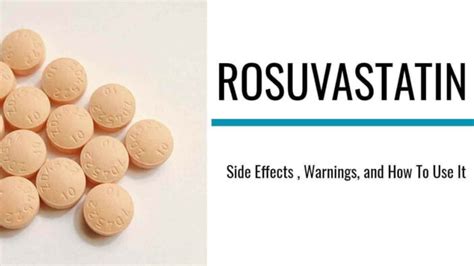
Rare but serious side effects of rosuvastatin include liver damage and muscle breakdown. These side effects can be life-threatening and require immediate medical attention. It is essential to monitor liver function and muscle enzymes while taking rosuvastatin, especially during the first year of treatment.
Rosuvastatin Interactions
Rosuvastatin can interact with other medications, including blood thinners, antibiotics, and antifungal medications. These interactions can increase the risk of side effects or reduce the effectiveness of rosuvastatin. It is essential to inform the doctor about all medications being taken, including prescription and over-the-counter medications, before starting rosuvastatin.Rosuvastatin and Diet
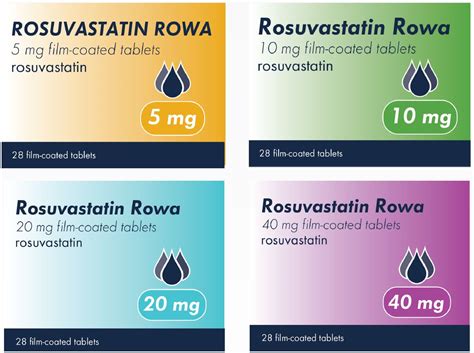
Foods that are high in soluble fiber, such as oats, barley, and fruits, can help to lower LDL cholesterol levels by binding to bile acids and removing them from the body. This can help to reduce the amount of cholesterol produced by the liver and lower LDL cholesterol levels.
Rosuvastatin and Exercise
Regular exercise can also help to improve cholesterol levels and overall health. Aerobic exercise, such as walking, running, and swimming, can help to increase HDL cholesterol levels and improve cardiovascular health. Resistance training, such as weightlifting, can also help to improve insulin sensitivity and reduce the risk of cardiovascular disease.Rosuvastatin and Pregnancy

Rosuvastatin and Breastfeeding
Rosuvastatin is also not recommended for use during breastfeeding, as it can pass into breast milk and cause harm to the baby. Women who are breastfeeding should not take rosuvastatin and should consult their doctor about alternative treatments.Rosuvastatin and Children
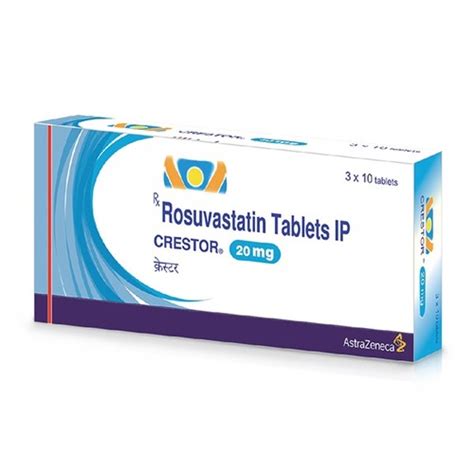
Rosuvastatin and Older Adults
Older adults who take rosuvastatin should be monitored closely for side effects, as they may be more susceptible to muscle pain and liver damage. Older adults should also be encouraged to report any side effects to their doctor, as they can be more severe in this age group.Rosuvastatin and Other Medications
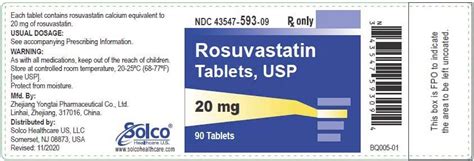
Rosuvastatin and Grapefruit Juice
Grapefruit juice can increase the levels of rosuvastatin in the blood, which can increase the risk of side effects. Individuals who take rosuvastatin should avoid drinking grapefruit juice or eating grapefruit, as it can interact with the medication.Rosuvastatin Alternatives
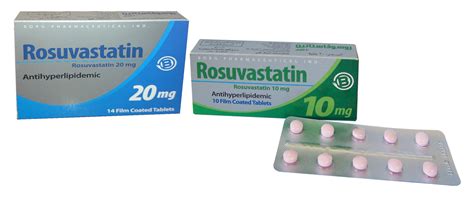
Rosuvastatin Generic
A generic version of rosuvastatin is available, which can be more affordable than the brand-name version. The generic version of rosuvastatin is just as effective as the brand-name version and can be used to lower cholesterol levels.What is rosuvastatin used for?
+Rosuvastatin is used to lower cholesterol levels and prevent cardiovascular disease.
How does rosuvastatin work?
+Rosuvastatin works by inhibiting the enzyme HMG-CoA reductase, which is involved in the production of cholesterol in the liver.
What are the side effects of rosuvastatin?
+Common side effects of rosuvastatin include muscle pain, headache, and nausea. Rare but serious side effects include liver damage and muscle breakdown.
Can I take rosuvastatin if I am pregnant or breastfeeding?
+No, rosuvastatin is not recommended for use during pregnancy or breastfeeding, as it can cause harm to the fetus or baby.
Are there any alternatives to rosuvastatin?
+Yes, there are alternative medications available, including other statins and non-statin medications.
In conclusion, rosuvastatin is a highly effective medication for reducing cholesterol levels and preventing cardiovascular disease. By understanding how rosuvastatin works, its benefits, and potential side effects, individuals can make informed decisions about their treatment. It is essential to work closely with a healthcare provider to determine the best course of treatment and to monitor for any side effects. By taking rosuvastatin as directed and making lifestyle changes, individuals can reduce their risk of cardiovascular disease and improve their overall health. We invite you to share your thoughts and experiences with rosuvastatin in the comments below and to share this article with anyone who may benefit from this information.
